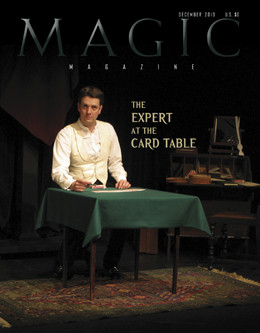by Craig Conley
What’s the secret for keeping a magic conference from turning into a “vicious circle”? For host Jeff McBride, it’s uncoiling that circle into a spiral, with a fixed starting point but enough momentum to spring. McBride’s unwound magic circle known as “Magic and Meaning” is an innovative, annual workshop held over four days in Las Vegas. McBride gathers a band of prominent thinkers, theorists, and philosophers of the art to spark insights for magicians from around the world. Attendees have only one thing in common: a quest to unravel the secrets of wonderment.
Named after a book by Eugene Burger and Robert E. Neale, Magic and Meaning is perhaps something of a misnomer, for the workshop doesn’t celebrate any one flavor of magic, and the so-called meaning of any particular trick is ultimately for each beholder to determine. But if we add an “s” to each word, we’re offered a clearer window into what actually unfolds here.
Magic(s) and Meaning(s) is an evolving concept, in keeping with McBride’s spirit of innovation (his Wonderground magic and performance art variety show was recently awarded most innovative nightclub experience in Las Vegas). Five years ago, the workshop was perhaps equal parts instruction, performance, and collaboration. Today, at a secret shelter from the city’s hubbub of excitement, breakthroughs are shared through succinct formal presentations (called PEP Talks) as well as more detailed keynote addresses, while the teaching of tricks and honing of skills occurs more intimately.
In October 2010, stalwarts Burger, Neale, Lawrence Hass, and George Parker led the proceedings. Keynotes included McBride’s secrets of meeting impossible deadlines and Neale’s revelations on the importance of being one’s own kindly dictator. PEP talks included Cory Haines’ ingenious methods for applying game show strategies to mentalism routines, Parker’s insights into how ocular blind spots gave birth to our conception of the devil, Jordan Wright’s demonstration that the surrealist artistic movement is magic’s greatest ally, Kenton Knepper’s cutting-edge techniques on character readings in magical performance, Gordon Meyer’s procedures for long-distance creative collaborations, and Abbi Spinner McBride’s explanation of how to birth miracles through magic “midwifing,” just to name a few. Other luminaries, like Luna Shimada, kept a low profile, with the promise of presenting next time.
In between formal talks and small group sessions, subtle teachings abound. For instance, Burger has a sort of running gag—he performs a brilliant card routine with someone, one-on-one, and as the gasps and shrieks die down his parting words are, “It’s the only thing I know.” His subtle teaching? I understood it to encapsulate several points simultaneously, including: “Do a single trick brilliantly and you’re a brilliant magician,” “To create wonderment is the one true ‘trick’ for a magician to master,” and “Speak with humility, tongue planted firmly in cheek—that’s great sleight-of-mouth.” Hass, a seasoned college professor, communicates his own subtle teachings in a different way. Loquacious as he is, Hass demonstrates by example the art of active listening.
The two words most commonly associated with the workshop—“storytelling” and “bizarre”—are not especially accurate. Magicians interested in storytelling are most certainly in attendance, yet while the inherent magic of language is celebrated, there is no formal instruction in crafting narratives. Indeed, Burger himself prefers pithily-condensed verbal accompaniments to his nimble-fingered feats. And while bizarrists may be attracted to the workshop, Magic(s) and Meaning(s) actually evolved out of a previous gathering called “Beyond Bizarre,” which actively sought to transcend the limitations and preconceptions of that label.
The most accurate word to associate with the workshop is likely “texture.” As Burger puts it, a highly textured magic show will take audiences in different ways, much the way a highly textured surface will reflect light across a broad spectrum. No two audience members will be dazzled by exactly the same sparkles. Burger suggests that how a trick is received is not what matters. “Once the trick is deceptive,” he explains, “it’s about me and what I want it to be."
Hass would seem to agree: “I believe seeing and feeling the tension about the meanings of magic is an important thing to do, because it prepares us for the step of figuring out where we want to land, and then walking the walk (and talking the talk) of our landing place.” Burger refers to a teaching in an ancient poem: what matters is the singing of one’s song, not its reception. He counsels magicians to let their magic “sing with greater clarity and love” so as to affect their audiences most deeply.
True to the spirit of self-determination, Burger discourages the brotherhood of magicians from using the word “we,” and in fact he considers that little pronoun to be an illusion of its own. “The deepest questions are personal ones,” he suggests to the workshop participants. “What do I want my magic to be? Because it can be anything!” His attitude is in keeping with the anti-proselytizing, pro-independence spirit of the event. Neale’s favorite definition of magic is “imagination at play,” and his goal for the workshop is “to encourage you to play with your imagination.” McBride’s own stated objective is to create a space in which individuals can shine in their own right.
Witnessing the complementary styles of the facilitators in action, one can’t help but to see them as cultivators of a magical garden. Burger—a bonsai artist, pruning away anything extraneous. Neale—a topiarist, fashioning shapes in some seriously silly ways. (As Neale says in Magic Matters, “It is important to be serious, and it is just as important to be silly with the serious.”) Hass—a hydroponic specialist, exposing the roots only to nourish them. Parker—a builder of matrices for vines to stretch upon in their own directions. McBride—a hedgerow trimmer, demarcating the fringes with safeguards and perhaps raising a labyrinth at the center.
Come to think of it, those two vanished s’s in the workshop’s title are perhaps best left invisible. According to Burger's credo on self-determination, there really is only one magic and one meaning—and that's
yours.



